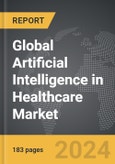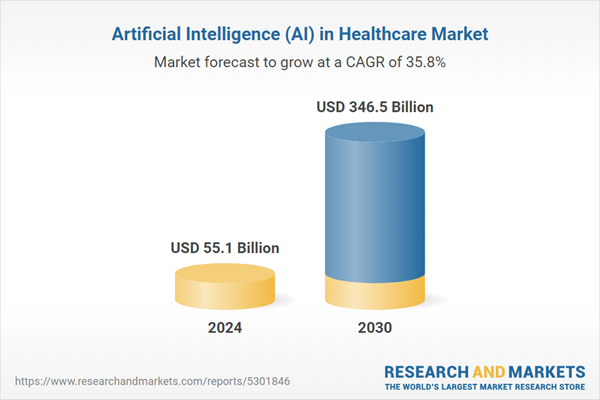Global Artificial Intelligence (AI) in Healthcare Market - Key Trends and Drivers Summarized
How Is AI Enhancing Diagnostic Accuracy and Patient Outcomes?
Artificial Intelligence (AI) is transforming diagnostics in healthcare, enabling faster, more accurate assessments that significantly impact patient outcomes. Traditionally, diagnoses relied heavily on a clinician's expertise and experience, but AI now augments this process by rapidly analyzing medical data and imaging with a level of precision that reduces the likelihood of human error. Machine learning algorithms in radiology, for example, can detect early signs of diseases like cancer, pneumonia, and cardiovascular disorders by scanning imaging data in real time, often identifying issues before symptoms manifest. Companies like Zebra Medical Vision and Aidoc are employing deep learning to interpret CT scans, MRIs, and X-rays with remarkable accuracy, assisting radiologists in making informed decisions quickly. Furthermore, AI models predict patient risks and track disease progression by analyzing electronic health records (EHRs), laboratory results, and genetic information, providing doctors with actionable insights. By enabling faster diagnoses and more personalized treatment plans, AI-driven diagnostics are improving patient outcomes, reducing hospital stays, and paving the way for a more proactive healthcare approach.Can AI Transform Personalized Treatment and Drug Discovery?
AI's potential to individualize treatments and expedite drug discovery is redefining how we approach patient care. Precision medicine, a rapidly growing field, leverages AI to customize treatment plans tailored to an individual's unique genetic makeup, lifestyle, and specific health conditions. By analyzing complex datasets that include genetic information, lifestyle factors, and previous health records, AI algorithms can suggest highly personalized therapies, optimizing treatment efficacy and reducing adverse reactions. IBM's Watson for Oncology, for instance, uses AI to recommend cancer treatment options based on individual patient data and an extensive library of medical literature, supporting oncologists in making well-informed decisions. In drug discovery, AI accelerates the identification of potential drug candidates, predicting how different molecules might interact and even identifying possible side effects, reducing the time and costs associated with traditional drug development. AI platforms like Atomwise and BenevolentAI use deep learning models to analyze molecular structures, expediting the research process that once took years. By enhancing personalized care and fast-tracking drug discovery, AI is revolutionizing how treatments are developed and delivered, ultimately benefiting patients through more effective and timely medical solutions.How Is AI Assisting in Operational Efficiency and Resource Management in Healthcare?
AI is driving significant advancements in operational efficiency and resource management within the healthcare sector, addressing longstanding issues like staff shortages, resource allocation, and patient wait times. Hospitals and healthcare providers are utilizing AI-driven predictive analytics to manage scheduling, staff allocation, and patient flow, optimizing these processes to reduce overcrowding and ensure that resources are used efficiently. For example, algorithms can predict peak times in emergency departments or clinics, allowing for better preparation and staffing adjustments, thereby minimizing patient wait times. Additionally, AI in EHR management automates repetitive administrative tasks such as data entry, claims processing, and billing, reducing the administrative burden on healthcare staff and improving overall efficiency. Virtual health assistants and chatbots are further alleviating workload by addressing patient queries, scheduling appointments, and reminding patients of medication, enhancing service quality without overwhelming healthcare personnel. By streamlining operations, AI enables healthcare providers to focus more on direct patient care, increasing efficiency and ensuring resources are deployed where they are most needed.What Factors Are Driving the Growth of AI in the Healthcare Market?
The growth in the AI in healthcare market is driven by several key factors, as advancements in technology and evolving healthcare needs accelerate AI adoption. Increasing healthcare data volumes, generated from medical imaging, genetic profiles, and wearable health devices, necessitate AI-driven analytics capable of making sense of these massive datasets. Consumer demand for personalized and proactive healthcare services is a primary driver, as patients increasingly expect tailored treatment plans and preventive care options. Technological advancements in natural language processing and computer vision are enhancing AI's capabilities in interpreting medical data and language-based health information, making AI indispensable for diagnostics, patient monitoring, and personalized medicine. Additionally, the global shift toward value-based care, which emphasizes outcome-driven treatments over volume-based services, aligns closely with AI's ability to improve diagnostic accuracy, optimize treatment plans, and predict patient outcomes. The rising prevalence of chronic diseases has further increased the need for AI solutions in patient monitoring and management. Government initiatives and private-sector investments in health technology are accelerating research and development in this area, encouraging innovation and expanding AI applications in healthcare. Together, these drivers indicate a transformative period for AI in healthcare, as it responds to both consumer demands and the industry's shift towards data-centric, efficient, and patient-focused care.Report Scope
The report analyzes the Artificial Intelligence (AI) in Healthcare market, presented in terms of market value (US$ Thousand). The analysis covers the key segments and geographic regions outlined below.- Segments: Component (Software, Hardware, Services); Technology (Machine Learning, Natural Language Processing, Context-Aware Computing, Computer Vision); Application (Clinical Trials, Robot-Assisted Surgery, Connected Machines, Fraud Detection, Diagnosis, Virtual Assistants, Dosage Error Reduction, Other Applications); End-Use (Hospitals & Healthcare Providers, Patients, Pharmaceuticals & Biotechnology Companies, Healthcare Payers, Other End-Uses).
- Geographic Regions/Countries:World; United States; Canada; Japan; China; Europe (France; Germany; Italy; United Kingdom; and Rest of Europe); Asia-Pacific; Rest of World.
Key Insights:
- Market Growth: Understand the significant growth trajectory of the Software Component segment, which is expected to reach US$177.2 Billion by 2030 with a CAGR of a 37.1%. The Hardware Component segment is also set to grow at 35.4% CAGR over the analysis period.
- Regional Analysis: Gain insights into the U.S. market, valued at $16.7 Billion in 2024, and China, forecasted to grow at an impressive 34.1% CAGR to reach $49.8 Billion by 2030. Discover growth trends in other key regions, including Japan, Canada, Germany, and the Asia-Pacific.
Why You Should Buy This Report:
- Detailed Market Analysis: Access a thorough analysis of the Global Artificial Intelligence (AI) in Healthcare Market, covering all major geographic regions and market segments.
- Competitive Insights: Get an overview of the competitive landscape, including the market presence of major players across different geographies.
- Future Trends and Drivers: Understand the key trends and drivers shaping the future of the Global Artificial Intelligence (AI) in Healthcare Market.
- Actionable Insights: Benefit from actionable insights that can help you identify new revenue opportunities and make strategic business decisions.
Key Questions Answered:
- How is the Global Artificial Intelligence (AI) in Healthcare Market expected to evolve by 2030?
- What are the main drivers and restraints affecting the market?
- Which market segments will grow the most over the forecast period?
- How will market shares for different regions and segments change by 2030?
- Who are the leading players in the market, and what are their prospects?
Report Features:
- Comprehensive Market Data: Independent analysis of annual sales and market forecasts in US$ Million from 2024 to 2030.
- In-Depth Regional Analysis: Detailed insights into key markets, including the U.S., China, Japan, Canada, Europe, Asia-Pacific, Latin America, Middle East, and Africa.
- Company Profiles: Coverage of players such as Amazon Web Services (Aws), Enlitic Inc., General Electric Company, General Vision, Google and more.
- Complimentary Updates: Receive free report updates for one year to keep you informed of the latest market developments.
Some of the 222 companies featured in this Artificial Intelligence (AI) in Healthcare market report include:
- Amazon Web Services (Aws)
- Enlitic Inc.
- General Electric Company
- General Vision
- IBM Corporation
- iCarbonX
- Intel Corporation
- Johnson & Johnson Services
- Koninklijke Philips
- Medtronic
- Micron Technology
- Microsoft Corporation
- Next IT Corp.
- Nvidia Corporation
- Siemens Healthineers (A Strategic Unit Of Siemens Group)
- Welltok Inc.
This edition integrates the latest global trade and economic shifts into comprehensive market analysis. Key updates include:
- Tariff and Trade Impact: Insights into global tariff negotiations across 180+ countries, with analysis of supply chain turbulence, sourcing disruptions, and geographic realignment. Special focus on 2025 as a pivotal year for trade tensions, including updated perspectives on the Trump-era tariffs.
- Adjusted Forecasts and Analytics: Revised global and regional market forecasts through 2030, incorporating tariff effects, economic uncertainty, and structural changes in globalization. Includes historical analysis from 2015 to 2023.
- Strategic Market Dynamics: Evaluation of revised market prospects, regional outlooks, and key economic indicators such as population and urbanization trends.
- Innovation & Technology Trends: Latest developments in product and process innovation, emerging technologies, and key industry drivers shaping the competitive landscape.
- Competitive Intelligence: Updated global market share estimates for 2025, competitive positioning of major players (Strong/Active/Niche/Trivial), and refined focus on leading global brands and core players.
- Expert Insight & Commentary: Strategic analysis from economists, trade experts, and domain specialists to contextualize market shifts and identify emerging opportunities.
Table of Contents
Companies Mentioned (Partial List)
A selection of companies mentioned in this report includes, but is not limited to:
- Amazon Web Services (Aws)
- Enlitic Inc.
- General Electric Company
- General Vision
- IBM Corporation
- iCarbonX
- Intel Corporation
- Johnson & Johnson Services
- Koninklijke Philips
- Medtronic
- Micron Technology
- Microsoft Corporation
- Next IT Corp.
- Nvidia Corporation
- Siemens Healthineers (A Strategic Unit Of Siemens Group)
- Welltok Inc.
Table Information
| Report Attribute | Details |
|---|---|
| No. of Pages | 402 |
| Published | January 2026 |
| Forecast Period | 2024 - 2030 |
| Estimated Market Value ( USD | $ 55.1 Billion |
| Forecasted Market Value ( USD | $ 346.5 Billion |
| Compound Annual Growth Rate | 35.8% |
| Regions Covered | Global |









